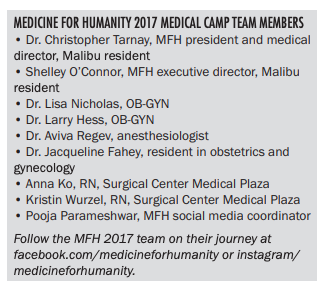Team to train providers, perform surgery for women with fistula
A UCLA surgical team dedicated to obstetric fistula care departed for Uganda Sept. 9 for their annual two-week medical camp.
The nine-member team will provide surgeries for women suffering from fistula, as well as training local providers and medical trainees in the techniques of fistula repair. The team, led by Malibu resident Dr. Christopher Tarnay, division chief of female pelvic medicine and reconstructive surgery at UCLA, operates under the Malibu-based nonprofit, Medicine for Humanity, or MFH. Through a partnership with the Mbarara University of Science and Technology, UCLA team members are playing a critical role in bridging gaps and ramping up the quality and access toward maternal health care and gynecologic surgery in Uganda.
Obstetric fistula can occur as a result of obstructed labor, when a baby becomes trapped in the birth canal, requiring emergency Cesarean section. Lack of timely access to health facilities in remote areas makes emergency Csections often unavailable, forcing a woman to endure this life-threatening labor. The consequences of the hours (most often, days) of obstructed labor are tragic; the baby can die due to the prolonged lack of oxygen, and the mother can be left with an uncontrollable and constant leaking of urine and/or stool from a severe injury that developed during the labor, which is fistula. The considerable gap between the number of new and existing fistula cases and the number of fistula repair surgeries being performed largely motivates the work of MFH.
For the past eight years, Tarnay has regularly been taking surgical teams to Uganda for fistula repair “camps,” two-week long concentrated collaborations between the MFH and MUST teams toward providing and extending fistula care. Every woman who needs fistula repair is provided the surgery, as well as all transportation, housing, food, medical support and postoperative rehabilitative services free of charge.
As a grassroots nonprofit organization, MFH spends all year fundraising for the trip and is supported by private donors and grants. All trip details, from broadcasting fistula repair services (via local Ugandan radio stations) to acquiring medical and surgical supplies, is achieved by the work of the very small, but determined, MFH Team.
Last year, the UCLA/ MFH team performed 64 fistula surgeries and 21 cesarean sections, a tremendous volume, as well as trained an entire cohort of local Ugandan residents in urogynecology. The emphasis that MFH places upon sustainability is key, by allocating a significant portion of time toward the training and education of local providers. Indeed, there is a striking paucity in the number of surgeons in Uganda who are trained in fistula repair.
The MFH team hopes to exceed last year’s numbers and continue to elevate the quality, delivery, and continuity of fistula repair services at MUST. Apart from capacity building and direct provision of surgical care, the work of MFH is also deeply linked to a more holistic, emotional aspect of healing.
“The team is able to do so much more than just repair the physical aspects of fistula,” Tarnay said. “This operation can be life changing. Being able to witness these women leave the hospital smiling and with hope perhaps for the first time in years brings tremendous gratification.”


